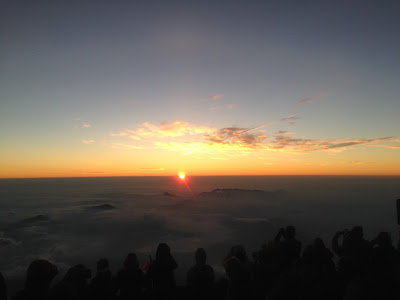The Filipino term "Hi-mag-si-kan" means revolution; for us it's means going beyond our comfort zone and pushing ourselves to the limits. During my time here, I've come to realize that our group in Yokohama has gained a reputation within kali circles as being a passionate bunch of individuals. Whether it be for this art or for just life in general; we are always looking for ways to improve by taking on new and exciting challenges. This certainly was the case when Sensei and our school administrator, Yoko, organized an overnight hike for the group to watch the sunrise on top of Mt. Fuji back in late July. Climbing Mt. Fuji has been on my Japan checklist so I was extremely excited for this opportunity but at the same time, a bit intimidated as well because I've never done anything like this before. Prior to the climb I did all my online research, attend a Mt. Fuji informational seminar on base, gym workouts, and even rented some essential hiking gear but nothing could have fully prepared me for this journey I was about to partake in.
We left Yokohama by bus at around 7am on the morning of July 27 and got to the 5th station of Mt. Fuji by 10:30am. We got a quick bite to eat before starting our ascent up the mountain at around 11:30am.
 |
| From Left to Right: Sensei Satoshi, Erik, Dee, Ben, Yoko, and me |
Because Mt. Fuji is considered a sacred mountain, there were many religious figures (mainly from the Japanese Shinto religion) climbing the mountain as well to reach the shrine at the very top.
Along the Yoshida Trail, there are many huts between the 7th and 8th stations where people can sleep, eat and use the restroom (starting around 8,858 ft.) Because these stations are so secluded, they charge hikers a fee of 200 Yen (about $1.60) to use the bathroom. They even charge a premium on the goods they sell for instance, a cup of noodles cost hikers 500 Yen, which is around $4 and an extra $1 if you want to eat your meal inside their hut. But the price mark-ups didn't stop us from buying a nice, ice-cold beer at the first 7th station hut for about $8 a can!
On my previous blog, I mentioned that I purchased a Mt. Fuji walking stick the day before this trip for a cool looking souvenir. Each station hut has a unique logo/symbol where a representative will actually brand your wooden walking stick for about 200 Yen. So of course as you get higher up the mountain, the more of these stamps you collect...I know for sure that this Mt. Fuji walking stick will be easily be one of my favorite mementos I bring back from Japan.
So fast forward to about 6:45pm in the evening, about another 2,000 feet up and we finally reach our hut, Taishikan, at the 8th station of Mt. Fuji. For 8,500 Yen, we got to rest here for the evening and get something to eat.
Dinner consisted of curry rice with fish, a mini pork hot dog, and dessert but I was so hungry at the time I really didn't really care what they fed us. At the same time, the workers at the hut also provided us with our breakfast which was similar to fried rice and a pastry.
After dinner, went outside to catch the sunset...amazing!
Lights out was around 8pm and it was nice to finally lie down after such a long day. But with all the people in the cabin along with my super-comfortable pillow, I maybe got a good hour or so of sleep. In order to catch the sunrise, we woke up at around 11:30pm and started our last stretch up the mountain at midnight. It was around 13 degree Celsius (55 degrees Fahrenheit) when we started but got down to the mid 30's by the time we got up to the top.
What at the beautiful early morning sky...
It took us about four hours (around 4:15am) to reach the top of the mountain (12,388 ft.) and there were already hundreds of people lined up looking towards the horizon. I managed to climb up to a window ledge of a building so I could get some unobstructed views of the sunrise...
Right after the sun rises everyone starts yelling out "Banzai!" We hung out for an hour or so to take in scenery before heading down.
The crater of Mt. Fuji:
For me, hiking down was the most difficult part of this journey. The loose volcanic rocks were very unstable as we descended down the zig-zag pathway causing me to loose my balance at times and put extreme pressure on my knees and feet. It took about four hours to make it back down to the 5th station and my legs were sore!
An interesting side note: the trail going down is different from the one going up the mountain. It's the same pathway that bulldozers use to deliver supplies to the huts:
Despite all the pain and fatigue, climbing Mt. Fuji was a big accomplishment! I will probably never do this again but the fact that I got take on this monumental challenge along with the friends I have made here in Japan is something I will never forget. Himagsik-tayo!














































